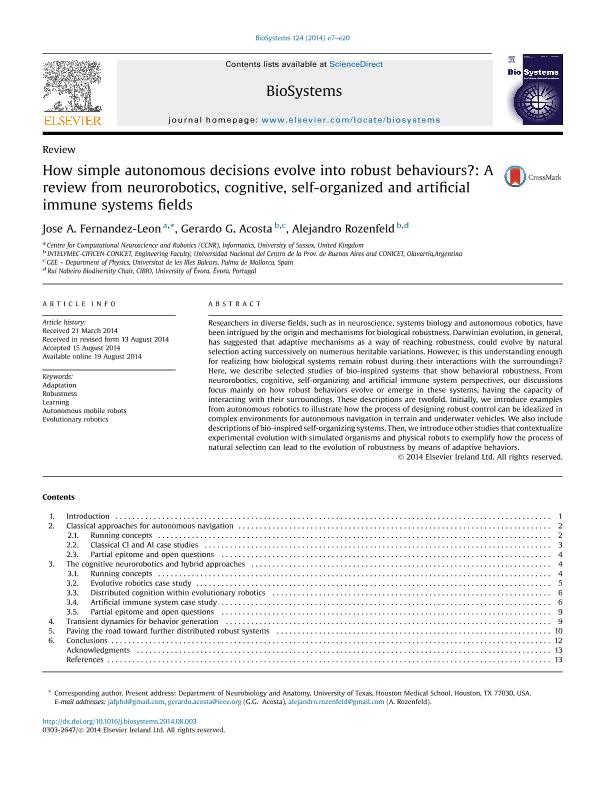Mostrar el registro sencillo del ítem
dc.contributor.author
Fernandez Leon, Jose Alberto

dc.contributor.author
Acosta, Gerardo Gabriel

dc.contributor.author
Rozenfeld, Alejandro Fabian

dc.date.available
2016-03-07T19:58:12Z
dc.date.issued
2014-08-19
dc.identifier.citation
Fernandez Leon, Jose Alberto; Acosta, Gerardo Gabriel; Rozenfeld, Alejandro Fabian; How simple autonomous decisions evolve into robust behaviours?: A review from neurorobotics, cognitive, self-organized and artificial immune systems fields; Elsevier; Biosystems; 124; 19-8-2014; 7-20
dc.identifier.issn
0303-2647
dc.identifier.uri
http://hdl.handle.net/11336/4668
dc.description.abstract
Researchers in diverse fields such as in neuroscience, systems biology and autonomous robotics have been intrigued by the origin and mechanisms forbiological robustness. Darwinian evolution, in general, has suggested that adaptive mechanisms, as a way of reaching robustness, could evolve by natural selection acting successively on numerous heritable variations. However, is this understanding enough for realizing how biological systems remain robust during their interactions with the surroundings? Here, we describe selected studies of bio-inspired systems that show behavioral robustness. From neurorobotics, cognitive, self-organizing and artificial immune system perspectives, our discussions focus mainly on how robust behaviors evolve or emerge in these systems, having the capacity of interacting with their surroundings. These descriptions are twofold. Initially, we introduce examples from autonomous robotics to illustrate how the process of designing robust control can be idealized in complex environments for autonomous navigation in terrain and underwater vehicles. We also include descriptions of bio-inspired self-organizing systems. Then, we introduce other studies that contextualize experimental evolution with simulated organismsand physical robots to exemplify how the process of natural selection can lead to the evolution of robustnessby means of adaptive behaviors.
dc.format
application/pdf
dc.language.iso
eng
dc.publisher
Elsevier

dc.rights
info:eu-repo/semantics/openAccess
dc.rights.uri
https://creativecommons.org/licenses/by-nc-nd/2.5/ar/
dc.subject
Adaptation
dc.subject
Robustness
dc.subject
Learning
dc.subject
Autonomous Mobile Robots
dc.subject.classification
Control Automático y Robótica

dc.subject.classification
Ingeniería Eléctrica, Ingeniería Electrónica e Ingeniería de la Información

dc.subject.classification
INGENIERÍAS Y TECNOLOGÍAS

dc.title
How simple autonomous decisions evolve into robust behaviours?: A review from neurorobotics, cognitive, self-organized and artificial immune systems fields
dc.type
info:eu-repo/semantics/article
dc.type
info:ar-repo/semantics/artículo
dc.type
info:eu-repo/semantics/publishedVersion
dc.date.updated
2016-03-30 10:35:44.97925-03
dc.journal.volume
124
dc.journal.pagination
7-20
dc.journal.pais
Países Bajos

dc.journal.ciudad
Amsterdam
dc.description.fil
Fil: Fernandez Leon, Jose Alberto. Consejo Nacional de Investigaciones Científicas y Técnicas. Centro Científico Tecnológico Conicet - Tandil; Argentina. University of Sussex; Reino Unido
dc.description.fil
Fil: Acosta, Gerardo Gabriel. Universidad Nacional del Centro de la Provincia de Buenos Aires. Facultad de Ingeniería Olavarria. Departamento de Electromecánica. Grupo Intelymec; Argentina. Consejo Nacional de Investigaciones Científicas y Técnicas. Centro Científico Tecnológico Tandil. Centro de Investigaciones en Física e Ingeniería del Centro de la Provincia de Buenos Aires; Argentina. Universidad de las Islas Baleares; España
dc.description.fil
Fil: Rozenfeld, Alejandro Fabian. Universidad Nacional del Centro de la Provincia de Buenos Aires. Facultad de Ingeniería Olavarria. Departamento de Electromecánica. Grupo Intelymec; Argentina. Consejo Nacional de Investigaciones Científicas y Técnicas. Centro Científico Tecnológico Tandil. Centro de Investigaciones en Física e Ingeniería del Centro de la Provincia de Buenos Aires; Argentina. University of Évora. Rui Nabeiro Biodiversity Chair; Portugal
dc.journal.title
Biosystems

dc.relation.alternativeid
info:eu-repo/semantics/altIdentifier/url/http://www.sciencedirect.com/science/article/pii/S0303264714001099
dc.relation.alternativeid
info:eu-repo/semantics/altIdentifier/doi/http://dx.doi.org/10.1016/j.biosystems.2014.08.003
Archivos asociados
